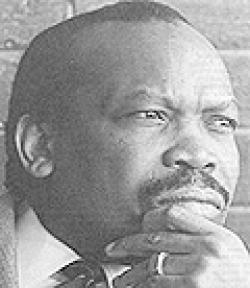
Published date
13 November 1950
Seretse Khama was the chief of the Bama-Ngwato tribe, Bechuanaland (now Botswana). Khama's problems with the British started when he married an English woman, Ruth Williams in September 1948, in England, without the permission of the tribal elders. His uncle and regent, Tshekedi Khama, wanted Khama to return home to rebuke him and to try to convince him to get a divorce. When Seretse Khama returned he managed to turn his people against Tshekedi, after a series of public meetings in Serowe. As a result he was still popularly recognised as chief, with Ruth as his wife. Tshekedi gave way and went into self-exile. The proclamation of a black chief with a white wife, in a territory strategically placed between South Africa and the Rhodesias, caused outcry among white settler politicians. South Africa had come under the control of white Afrikaner nationalists in 1948. The British were told that there was no chance of the pro-British opposition party winning the next all-white election in South Africa, if Seretse Khama was allowed to be chief of the Bangwato. The Labour government in Britain desperately needed South African gold and uranium. It agreed to bar Seretse Khama from chieftainship. The Commonwealth relations minister denied that the government was bowing to racism, and lied about this before the House of Commons. A judicial enquiry was set up to prove Seretse's personal unfitness to rule. However, Justice Harragin concluded that Seretse was eminently fit to rule. His report was therefore suppressed by the British government for thirty years. On 13 November 1950 the British asked Khama to renounce his chieftancy, and they offered a pension in return. But Khama refused, so the British exiled Khama and his wife to England in 1951. In 1956, a new Commonwealth relations minister realised that Britain had too distance itself from the institutionalised racism in South Africa, which had previously influenced the British decision to ban Khama, so they decided to allow Seretse and Ruth home as commoners and private citizens. They returned home in that same year. In the 1960s Seretse Khama became leader of the Bechuanaland Democratic Party (BDP), which had a lot of support from both progressive and conservative circles. In 1965 the BDP won the elections, and Seretse Khama became Prime Minister. The next year, Bechuanaland gained its independence from Britain. The new republic's name was changed to Botswana, with Sir Seretse Khama as its first President.
References
thuto,'A brief biography of Sir Seretse Khama, Botswana's first president' [Online] Available at: www.thuto.org, [Accessed: 07 October 2013]|
about ,'This day in African History, 13 November' [Online] Available at: africanhistory.about.com, [Accessed: 07 October 2013]